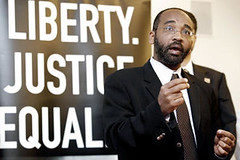
Yassir Fazaga, a religious leader of Orange County Islamic Foundation takes questions from the media, as he announces a lawsuit against the FBI at the ACLU Foundation of Southern California headquarters in Los Angeles.
Originally uploaded by Pan-African News Wire File Photos
Council on American-Islamic Relations and ACLU say a paid FBI informant violated the First Amendment rights of worshipers at several California mosques, targeting the most devout. They sued the FBI Wednesday
By Patrik Jonsson, Staff writer
February 23, 2011 at 8:26 pm EST
In a case that could test law enforcement's ability to identify and monitor potential terrorists inside the United States, an Islamic organization has sued the FBI for the actions of a paid spy who infiltrated several Orange County mosques in California in the mid-2000s.
The American Civil Liberties Union and the Council on American-Islamic Relations allege in the lawsuit, filed in Los Angeles, that a paid informant named Keith Monteilh violated the First Amendment rights of hundreds of Muslim worshipers when he performed "indiscriminate surveillance" on "people who were more devout in their religious practice, irrespective of whether any particular individual was believed to be involved in criminal activity."
The FBI responded that it doesn't ask its informants or agents to target people for their religious affiliations, and maintains it has done a good job of balancing civil liberties with its ongoing antiterrorism work.
Nevertheless, the case threatens to erode already-tenuous relationships between law enforcement and the broader American Muslim community, which has the best potential to spot suspicious behavior in its midst. That ability – and willingness – was illustrated in this case.
Mr. Monteilh "became an agent provocateur," says Ibrahim Hooper, national CAIR spokesman. "He was the one suggesting all these kinds of bizarre activities to the extent that community itself turned him in."
The Monteilh affair was particularly galling to Los Angeles-area Muslims, since he was working in a mosque where an FBI official had promised no such surveillance would take place under his watch.
More broadly, targeting mosques and even fervent believers is a sure way for the FBI to alienate moderate, law-abiding Muslims, says Ameena Mirza Qazi, staff attorney of CAIR-Los Angeles.
"When Muslims perceive that they are viewed as a suspect community by law enforcement or the FBI, it really has a devastating effect on relations between law enforcement authorities and American Muslims," says CAIR's Mr. Hooper.
But the FBI can't ignore the role of mosques as potential hubs of terror activity, says Gabriel Schoenfeld, a national security expert at the Hudson Institute. Some of the organizers of the first World Trade Center attack in 1993, for example, met at a mosque in New Jersey.
"Mosques can't be sanctuaries for criminals," says Dr. Schoenfeld, author of "Necessary Secrets: National Security, Media, and the Rule of Law."
"Even if the FBI did something wrong in this case, that would not eliminate the need for the agency to investigate places like mosques, where terror activities have been cooked up in the past. Does that cut against the First Amendment? Undoubtedly. But the First Amendment isn't a suicide pact. It has to be balanced against other provisions of the Constitution, like providing for the common defense," argues Schoenfeld.
The lawsuit contends that Monteilh's FBI handlers told him to collect e-mail address, phone numbers, and other pertinent information about Muslims, and "explicitly told Monteilh that Islam was a threat to America's national security."
Legal experts say the lawsuit could succeed if the ACLU proves that the FBI targeted Muslims for their religious beliefs. But resting an entire case on a paid informant – with a criminal record, in Monteilh's case – can be tricky. "Using informants is an unsavory business, and informants often lie,'' John Baker, a Louisiana State University law professor, tells the Washington Post. "How trustworthy is his information? No one knows.''
Schoenfeld adds that lawyers could also parse the allegation that the FBI asked Monteilh to look for worshippers who were particularly devout. "What does that mean?" he says. "Are they devout in trying to memorize the Koran, or are they devout in preaching a political brand of Islam? That could be legitimate for the the FBI to investigate."
"Nobody objects" to the FBI investigating "when there's actual probable cause," says Hooper, "but to just say, 'go into these various mosques and see what you can dig up' – and even suggest to people that they should engage in criminal activity – that is something that is way beyond the pale."
No comments:
Post a Comment